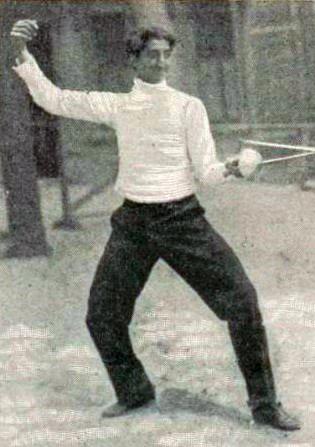1. Early Life and Education
Ramón Fonst Segundo was born in Havana, Cuba. Despite his Cuban origins, he spent the majority of his youth in France, where he received his extensive fencing education. This foundational training in France, a hub for fencing excellence, prepared him for a remarkable international career. He was just 16 years old when he made his Olympic debut at the 1900 Summer Olympics in Paris.
2. Fencing Career
Ramón Fonst's fencing career was marked by extraordinary success and groundbreaking achievements across multiple Olympic Games and regional competitions, establishing him as a dominant figure in the sport.
2.1. 1900 Paris Olympics
Fonst made his Olympic debut at the 1900 Summer Olympics in Paris, France. He participated in the men's épée event, which drew 101 fencers from 10 different countries. In his initial round, he emerged victorious against five French fencers, securing his advancement. He continued to progress, finishing third in subsequent rounds, which was sufficient to qualify for the semi-finals and ultimately the final.
In the final, Fonst faced a challenging field of seven French fencers and one Argentine competitor. Defying expectations, he won four of his six matches to claim the gold medal. This victory was historic, making him the first Cuban and the first Latin American athlete to win an Olympic medal. A few days after his gold medal performance, Fonst competed in the men's amateurs-masters épée event. This unique competition pitted the top four amateur fencers against the top four professional fencers from the Games. Fonst won six of his seven contests, earning a silver medal. His only defeat in this event came against the French professional Albert Ayat, who went on to win the gold.

2.2. 1904 St. Louis Olympics
Four years later, Ramón Fonst demonstrated his continued dominance at the 1904 Summer Olympics in St. Louis, Missouri, United States. Within a span of two days, he secured three gold medals. He successfully defended his Olympic title in the men's épée event, showcasing his consistent skill. He also added a gold medal in the men's foil event. Furthermore, competing under a mixed team banner, Fonst won the men's team foil event alongside his fellow Cuban fencer Manuel Díaz and American fencer Albertson Van Zo Post.
2.3. 1924 Paris Olympics
Cuba did not compete in the Summer Olympics again until 1924, when the Games returned to Paris, France. By this time, Fonst was 40 years old. He again competed in the men's épée individual event, where he reached the semi-finals. He also participated in the men's team épée event, but the Cuban team was eliminated in the quarter-finals.
2.4. Central American and Caribbean Games
Beyond his Olympic triumphs, Fonst also achieved considerable success in regional competitions. He competed in three editions of the Central American and Caribbean Games. He earned six gold medals across the 1926, 1930, and 1938 Games, further solidifying his legacy as a prolific champion.
3. Post-Athletic Career
After retiring from active competition as an athlete, Ramón Fonst transitioned into significant administrative roles within the sports community. He served as the president of the Cuban National Olympic Committee, playing a crucial role in the organization and development of Cuban sports. Additionally, he held an advisory position for the Department of Physical Education and Sports, a role he maintained until his death. During his time in Cuba, particularly after the outbreak of World War II, Fonst frequently fenced with George Worth, who later became an American Olympic medalist fencer, during Worth's two years living in Cuba after fleeing Hungary.
4. Death
Ramón Fonst Segundo died on September 9, 1959, at the age of 76. He passed away in his birthplace, Havana, Cuba, due to complications from a diabetic coma.
5. Legacy and Influence
Ramón Fonst's impact on fencing, both in Cuba and globally, is profound. As the first non-European and the only Latin American Olympic fencing champion, he broke significant barriers and opened the door for future athletes from the region. His remarkable collection of Olympic gold and silver medals, coupled with his numerous victories at the Central American and Caribbean Games, cemented his status as one of the greatest fencers of his era. Fonst's pioneering spirit and sustained excellence continue to inspire fencers and athletes, leaving an enduring legacy on the sport and in Olympic history.